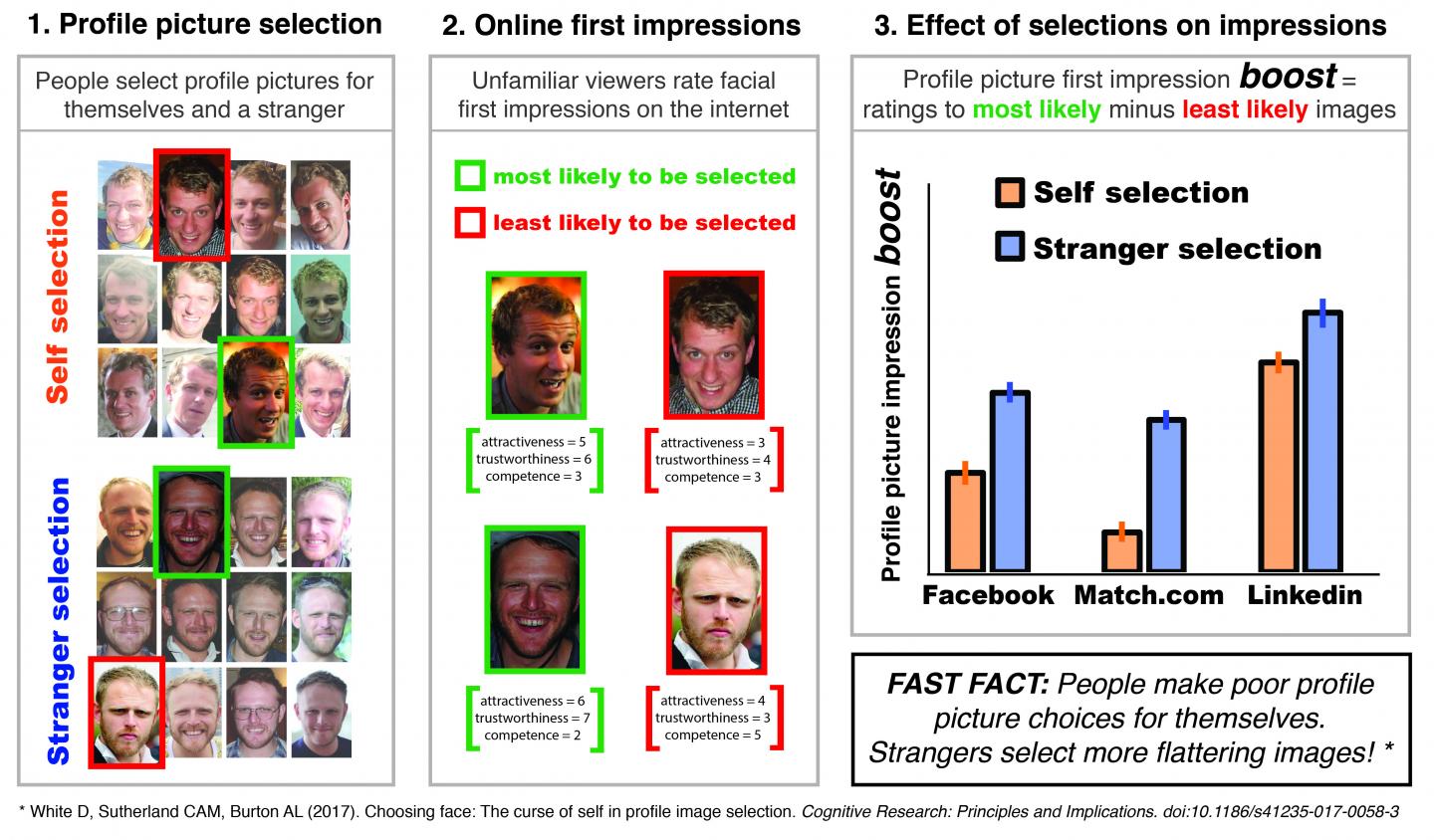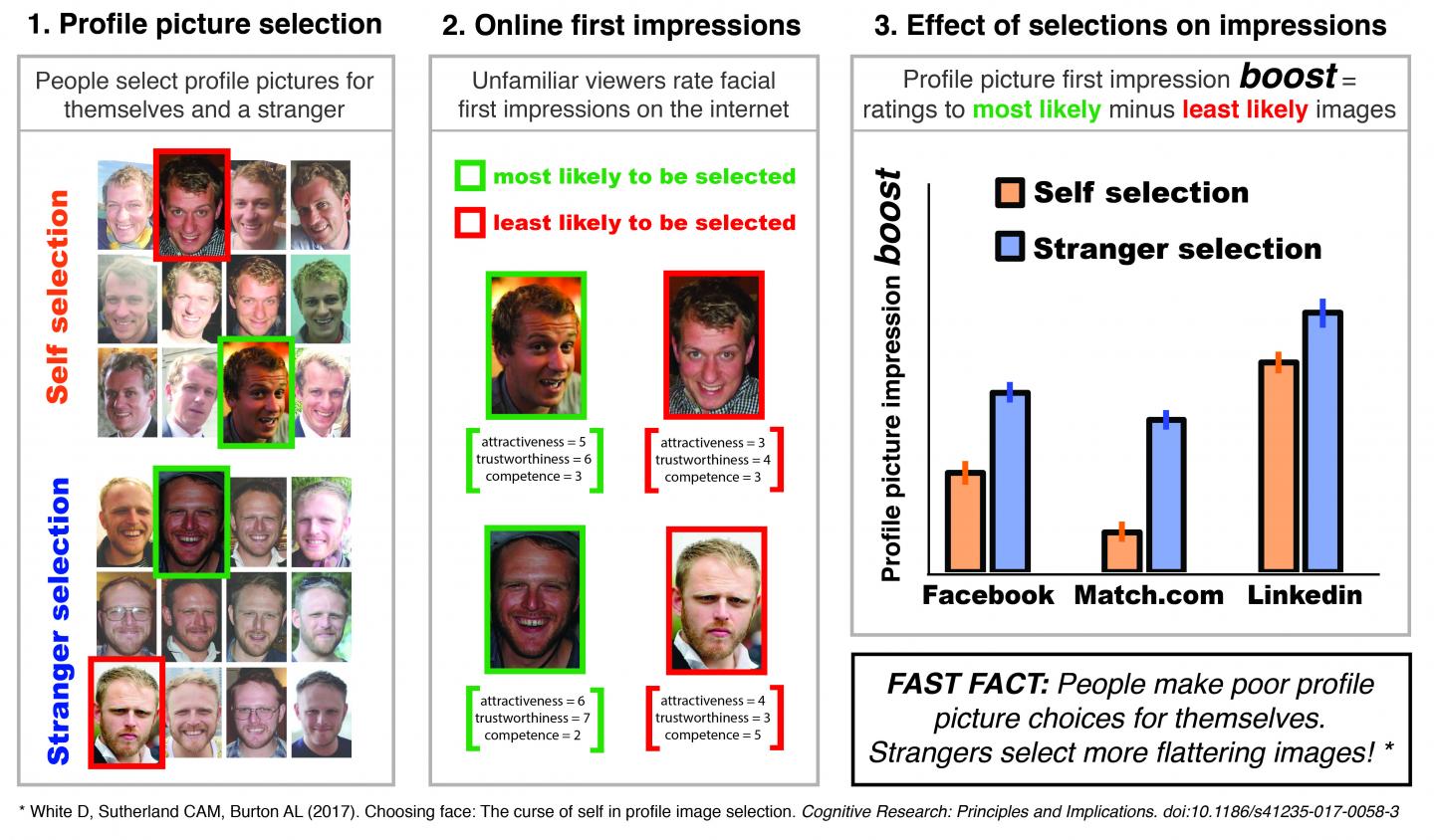
Credit: Please credit 'choosing face infographic by David White'
When trying to pick the most flattering pictures for online profiles, it may be best to let a stranger do the choosing, a study published in the open access journal Cognitive Research: Principles and Implications suggests.
In the first study to investigate the process by which people choose their profile pictures, a team led by researchers at UNSW Sydney, Australia found that images selected by strangers convey more favorable first impressions than images people select for themselves. The findings appear to contradict previous research which showed that people tend to portray themselves more favorably than others.
Dr David White, lead author of the study said: "Our findings suggest that people make poor choices when selecting flattering images of themselves for online profile pictures, which affects other people's perception of them. This effect is likely to have a substantial impact on online interactions, the impressions people form and the decisions they base on them, including whether to employ, date, befriend or even vote for someone."
Dr White said: "Previous work has shown that people make inferences about an individual's character and personality within a split second of seeing a photograph of their face, so our results have clear practical implications; if you want to put your best face forward, it makes sense to ask someone else to choose your picture."
To find out whether selecting one's own profile picture might have a positive or negative effect on first impressions, the researchers asked 102 students to select two out of 12 photos of their own face that they were most or least likely to use as a profile picture in three online network contexts: social networks, dating sites and professional networks.
Participants were then asked to do the same for 12 images of a randomly selected stranger who had participated in the study previously. The researchers found that people tended to select images that highlighted positive personality traits in line with the context of the website that the image was for.
Dr White said: "Our results demonstrate that people know how to select profile pictures that fit specific networking contexts and make positive impressions on strangers: dating images appear more attractive, and professional images appear more competent."
However, when the researchers showed these images to unfamiliar viewers (i.e. strangers) they had recruited via the internet and asked them to rate how attractive, trustworthy, dominant, confident or competent the person in them appeared, they found that the images people had selected for themselves made a less favorable impression than images selected by others.
Dr White added: "Future research needs to investigate the mechanisms that underlie the choices people make when selecting profile pictures to find out why people seem to have a limited ability to select the most flattering images of themselves."
###
Media Contact
Matthew Lam
Press Manager
BioMed Central
T: +44 (0)20 3192 2722
E: [email protected]
Notes to editors:
1. An infographic is available here: http://bit.ly/2nDhbY2
Credit must be given in any re-use as 'Choosing face infographic' by David White.
2. Research article: Choosing face: The curse of self in profile image selection.
White et al
Cognitive Research: Principles and Implications 2017
DOI: 10.1186/s41235-017-0058-3
During the embargo period, please contact Matthew Lam for a copy of the manuscript.
After the embargo lifts, the article will be available at the journal website here: https://cognitiveresearchjournal.springeropen.com/articles/10.1186/s41235-017-0058-3
Please name the journal in any story you write. If you are writing for the web, please link to the article. All articles are available free of charge, according to BioMed Central's open access policy.
3. Cognitive Research: Principles and Implications publishes new empirical and theoretical work covering all areas of Cognition, with a special emphasis on use-inspired basic research: fundamental research that grows from hypotheses about real-world problems. We expect that authors will be able to explain in a Significance section how their basic research serves to advance our understanding of the cognitive aspects of a problem with real-world applications.
4. SpringerOpen, launched in June 2010, includes Springer's portfolio of 200+ peer-reviewed fully open access journals across all areas of science. In August 2012, due to the growing demand for open access and the success of our SpringerOpen journals, we expanded our offering to open access books. Published under the SpringerOpen brand they complement our established open access journal portfolio. SpringerOpen journals and books are made freely and permanently available online immediately upon publication. They are subject to high-level peer review, author and production services ensuring quality and reliability of the work. Authors publishing with SpringerOpen retain the copyright to their work, licensing it under a Creative Commons license. To cover the cost of the publication process, all SpringerOpen journals and books charge an open access fee.
5. BioMed Central is an STM (Science, Technology and Medicine) publisher which has pioneered the open access publishing model. All peer-reviewed research articles published by BioMed Central are made immediately and freely accessible online, and are licensed to allow redistribution and reuse. BioMed Central is part of Springer Nature, a major new force in scientific, scholarly, professional and educational publishing, created in May 2015 through the combination of Nature Publishing Group, Palgrave Macmillan, Macmillan Education and Springer Science+Business Media. http://www.biomedcentral.com
Media Contact
Matthew Lam
[email protected]
020-319-22722
@biomedcentral
http://www.biomedcentral.com
############
Story Source: Materials provided by Scienmag





